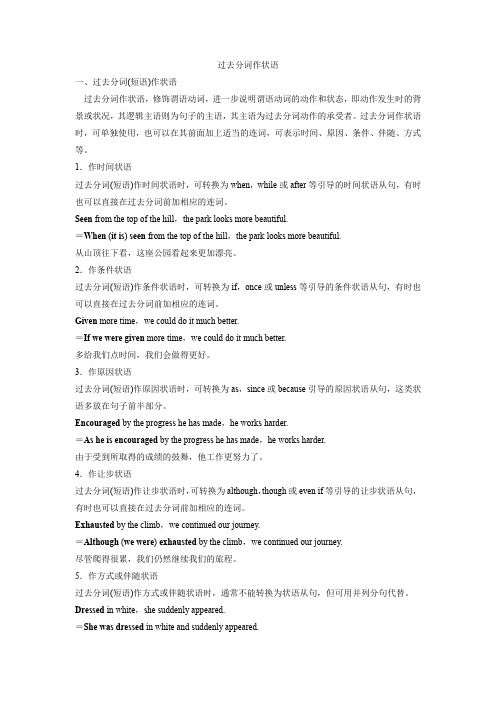过去分词作状语
过去分词作状语详解

过去分词作状语详解一.过去分词作状语的基本用法:过去分词作状语主要是说明谓语动作发生的背景或条件;表示原因、时间、条件、让步、方式或伴随情况等。
过去分词可置于主句前,也可置于主句后,用逗号与主句隔开。
例如:1. 原因状语Choked by the heavy smoke, he could hardly breathe. 他被浓烟呛了,几乎不能呼吸了。
Caught in a heavy rain, he was all wet. 因为淋了一场大雨,所以他全身湿透了。
Frightened by the noise in the night, the girl didn’t dare to sleep in her room. 受到夜晚响声的惊吓,那姑娘不敢睡在她的房间。
2. 时间状语Left to itself in the room, the baby began to cry.当被孤独地留在房间里时,婴儿哭了起来。
Asked why he did it, the monitor said it was his duty. 当被问及这件事时,班长说这是他的职责。
Approached in the dark, the lights looked lonely and purposeless. 在黑暗中走近时。
那些电灯显得孤单而无意义。
3. 条件状语Seen in this aspect, the matter isn’t as serious as people generally suppose.如果从这个角度看,问题并不像人们一般预料的那样`严重。
Grown in rich soil, these seeds can grow fast. 如果种在肥沃的土壤里,这些种子能长得很快。
Given better attention, the accident could have been avoided. 要是多加注意,那次事故就能避免了。
过去分词做状语

某些过去分词(短语)来源于系表结构,有些甚至具有形 容词的特征,因此,虽然它们作状语时与句子主语之间存 在逻辑意义上的主动关系,但仍然用它们的过去分词来作 状语。这类过去分词(短语)常见的主要有:caught in,
devoted to, disappointed at, determined to, dressed in, exhausted,hidden, lost in, prepared for, seated, tired of 等。 Caught in the heavy rain, Jennifer didn’t arrive on time. Disappointed at the examination results, the top student sat there in stony silence. Entirely devoted to the Party, the young soldier gave his life for his country.
√
looking "We can't go out in this weather," said Bob, ________
(look) out of the window. 过去分词与句子主语构成动宾关系(被动), 而现在分词 与句子主语构成主谓关系(主动)。
现在分词的时态和语态
主动形式 一 般 式 完 成 式 (not) doing 被动形式 (not) being done
(not) having been (not) having done done
1. Not knowing his address, I could do nothing but stay at home and wait. 2. Not having received his father’s letter, he decided to make a call to him. 3. Having been translated into many different languages, this book become well known all over the world.
过去分词作状语的用法归纳

过去分词作状语的用法归纳
1. 哎呀,当过去分词表示被动或完成的时候,就可以作状语啦!就像“He was deeply moved by the story.”这里的“moved”就是被故事深深打动呀。
2. 嘿,要是过去分词用来表达原因,那也是很妙的哟!比如说“Frustrated by the failure, he almost gave up.”这“Frustrated”不就是因为失败而沮丧嘛。
3. 哇塞,当过去分词表示时间,这多神奇呀!像“Seen from the top of the mountain, the view is amazing.”看到没,“Seen”就是从山顶被看到那个时间点呀。
4. 哟呵,过去分词表示条件的时候,是不是很有意思呀!例如“If prepared well, you will do great.”这里的“prepared”就是如果准备好这个条件呀。
5. 哈哈,过去分词还能表示让步呢!像“Though beaten many times, he still doesn't give up.”“beaten”就是尽管被打击很多次啦。
6. 哎呀呀,当表示方式或伴随的时候,过去分词也能上呀!比如“She sat there, lost in thought.”“lost”不就是那种伴随的状态嘛。
7. 嘿呀嘿呀,过去分词作状语的时候,可真是变化多端呢!就像“Surrounded by his friends, he feels happy.”“Surrounded”就是周围被朋友围着呀。
8. 哇哦,过去分词这么有用,大家可得好好掌握呀!
总之,过去分词作状语的用法很多,大家要多多练习,才能运用自如呀!。
过去分词作状语

动词-ing或过去分词作状语, 其逻辑 主语应是主句主语。
2. If ___ the same treatment again, he’s sure to get well. A. giving B. give C. given D. being given
3. _____ in 1636, Harvard is one of the
A. followed C. to be followed
B. following D. being followed
3. The next morning she found the man _A__ in bed, dead.
A. lying C. lay
B. lie D. laying
4. I can hardly imagine Peter _B__ across the Atlantic Ocean in five days.
A. are bought B. bought C. been bought D. buying
( D)14. Don’t use words, expressions, or phrases ________ only to people with specific knowledge. A. being known B. having been known C. to be known D. known
高考链接
(A)1. _______ more attention, the tree
could have grown better.
A. Given B. To give
C. Giving D. Having given.
(D)2. The computer center, ________ last
过去分词作状语的用法

过去分词作状语(The Past Participle used as Adverbial) 一、过去分词作状语的一般用法1. 过去分词作状语,可以表示时间,原因,条件,让步及伴随情况等。
过去分词作状语,可以表示时间,原因,条件,让步及伴随情况等。
过去分词作状语,其逻辑主语必须和句子主语保持一致,并且必须是被动关系。
过去分词作状语,其逻辑主语必须和句子主语保持一致,并且必须是被动关系。
Asked how he broke into the room, he made no answer. (当有人问他怎么闯进屋里来,他一声不吭。
)_________________________________ When heated ,water will be turned into steam. 水加热后会变成蒸汽。
(表示时间)(表示时间) ___________________________________ Deeply moved by the film , we all cried. 由于被电影深深打动,我们都哭了。
(表示原因)___________________________________ Born into a poor family , he had no more than two years of schooling. 出生于贫苦家庭,他只上了两年学。
___________________________________ Given more help, we could have done the work better. 如果给我们的帮助多一些,我们本来能做的更好。
(条件)___________________________________ Though frightened by the big fire , he stood out bravely. 尽管害怕大火,可他还是勇敢地站了起来。
语法专题:过去分词作状语

过去分词作状语一、过去分词(短语)作状语过去分词作状语,修饰谓语动词,进一步说明谓语动词的动作和状态,即动作发生时的背景或状况,其逻辑主语则为句子的主语,其主语为过去分词动作的承受者。
过去分词作状语时,可单独使用,也可以在其前面加上适当的连词,可表示时间、原因、条件、伴随、方式等。
1.作时间状语过去分词(短语)作时间状语时,可转换为when,while或after等引导的时间状语从句,有时也可以直接在过去分词前加相应的连词。
Seen from the top of the hill,the park looks more beautiful.=When (it is) seen from the top of the hill,the park looks more beautiful.从山顶往下看,这座公园看起来更加漂亮。
2.作条件状语过去分词(短语)作条件状语时,可转换为if,once或unless等引导的条件状语从句,有时也可以直接在过去分词前加相应的连词。
Given more time,we could do it much better.=If we were given more time,we could do it much better.多给我们点时间,我们会做得更好。
3.作原因状语过去分词(短语)作原因状语时,可转换为as,since或because引导的原因状语从句,这类状语多放在句子前半部分。
Encouraged by the progress he has made,he works harder.=As he is encouraged by the progress he has made,he works harder.由于受到所取得的成绩的鼓舞,他工作更努力了。
4.作让步状语过去分词(短语)作让步状语时,可转换为although,though或even if等引导的让步状语从句,有时也可以直接在过去分词前加相应的连词。
过去分词作状语
(Because he was caught in a heavy rain)
表示条件,相当于 表示条件 相当于if, unless引导的条件状语 相当于 引导的条件状语 从句
如果种在肥沃的土壤里,这些种子能长得很快。 如果种在肥沃的土壤里,这些种子能长得很快。
7. Unless ___ to speak, you should remain silent at the conference. A. invited C. being invited B. inviting D. having invited
8. When _____, the museum will be open to the public next year. A. completed B. completing C. being completed D. to be completed 析:正确答案为 A 项。博物馆是被完 工的, 工的 所以该空应填过去分词 completed 作状语。 作状语。
过去分词作状语
过去分词在句中一般能作时间、原因、 过去分词在句中一般能作时间、原因、 时间 条件、让步和方式状语。 条件、让步和方式状语。如: 表示原因,相当于由as, since, 或because 表示原因,相当于由 引导的原因状语从句
Caught in a heavy rain, he was all wet.
4._______ (give) more time, I’ll finish my Given work on time. 5. Compared with _________ (develop) developed countries, we still have a long way to go. 6. The English teacher entered the room, _________ (folቤተ መጻሕፍቲ ባይዱow) by his students. followed
过去分词作状语
过去分词作状语过去分词作状语可表示时间、原因、条件、让步、方式或伴随情况等。
掌握其用法应该注意以下几点一、过去分词作状语与状语从句之间的转换1)表示时间,相当于一个时间状语从句,为了明确其意义有时可在分词前加上when,while等连词。
如:⑴Asked why she didn’t do it ,she began to cry.=When she was asked why she didn’t do it,she began to cry.当问到她为什么没有做此事时,她开始哭了起来。
⑵Seen from the top of the hill, the city looked like a big garden.=When we see it from the top of the hill, the city looked like a big garden.从山顶上看,这个城市就像一个大花园。
2)表示原因,相当于as, since, because引导的原因状语从句。
如:⑴She soon fell asleep, tired by the journey.=Since she was tired by the journey she soon fell asleep.由于旅途劳累,她很快就睡着了。
⑵Born and brought up in the village.=Because he was born and brought up in the village.由于生长在那个村庄,所以他认识那里许多人。
3)表示条件,相当于一个条件状语从句,有时过去分词前可用if, unless 等词。
如:⑴Given half an hour, I can also work out this problem.=If I am given half an hour, I can also work out this problem.如果再给我半小时,我也能解出这道题。
过去分词作状语的用法归纳
过去分词作状语一.过去分词作状语的基本用法:过去分词作状语主要是说明谓语动作发生的背景或条件;表示原因、时间、条件、让步、方式或伴随情况等。
过去分词可置于主句前,也可置于主句后,用逗号与主句隔开。
1. 原因状语Choked by the heavy smoke, he could hardly breathe. 他被浓烟呛了,几乎不能呼吸了。
Caught in a heavy rain, he was all wet. 因为淋了一场大雨,所以他全身湿透了。
Frightened by the noise in the night, the girl didn’t dare to sleep in her room. 受到夜晚响声的惊吓,那姑娘不敢睡在她的房间。
2. 时间状语Left to itself in the room, the baby began to cry.当被孤独地留在房间里时,婴儿哭了起来。
Asked why he did it, the monitor said it was his duty. 当被问及这件事时,班长说这是他的职责。
Approached in the dark, the lights looked lonely and purposeless. 在黑暗中走近时。
那些电灯显得孤单而无意义。
3. 条件状语Seen in this aspect, the matter isn’t as serious as people generally suppose. 如果从这个角度看,问题并不像人们一般预料的那样`严重。
Grown in rich soil, these seeds can grow fast. 如果种在肥沃的土壤里,这些种子能长得很快。
Given better attention, the accident could have been avoided. 要是多加注意,那次事故就能避免了。
过去分词作状语的用法归纳
过去分词作状语一.过去分词作状语的基本用法:过去分词作状语主要是说明谓语动作发生的背景或条件;表示原因、时间、条件、让步、方式或伴随情况等。
过去分词可置于主句前,也可置于主句后,用逗号与主句隔开。
1. 原因状语Choked by the heavy smoke, he could hardly breathe. 他被浓烟呛了,几乎不能呼吸了。
Caught in a heavy rain, he was all wet. 因为淋了一场大雨,所以他全身湿透了。
Frightened by the n oise in the night, the girl didn’t dare to sleep in her room. 受到夜晚响声的惊吓,那姑娘不敢睡在她的房间。
2. 时间状语Left to itself in the room, the baby began to cry.当被孤独地留在房间里时,婴儿哭了起来。
Asked why he did it, the monitor said it was his duty. 当被问及这件事时,班长说这是他的职责。
Approached in the dark, the lights looked lonely and purposeless. 在黑暗中走近时。
那些电灯显得孤单而无意义。
3. 条件状语Seen in this aspect, the matter isn’t as serious as people generally suppose. 如果从这个角度看,问题并不像人们一般预料的那样`严重。
Grown in rich soil, these seeds can grow fast. 如果种在肥沃的土壤里,这些种子能长得很快。
Given better attention, the accident could have been avoided. 要是多加注意,那次事故就能避免了。
- 1、下载文档前请自行甄别文档内容的完整性,平台不提供额外的编辑、内容补充、找答案等附加服务。
- 2、"仅部分预览"的文档,不可在线预览部分如存在完整性等问题,可反馈申请退款(可完整预览的文档不适用该条件!)。
- 3、如文档侵犯您的权益,请联系客服反馈,我们会尽快为您处理(人工客服工作时间:9:00-18:30)。
【答题指导】分词在句子中作状语,分词的逻辑主语与句子的主语一致。使用何 种分词,要取决于分词与句子主语之间的关系:主谓关系用现在分词,动宾或被 动关系用过去分词。比较:
Seen from the sky, our city is very beautiful. (our city与see之间是被 动关系)
我们的英语老师走进了教室,手里拿着试卷。 ② There is a river in the valley, fresh flowers on the banks.
山谷中有一条河,河两岸长满了鲜花。 5、名词或代词主格 + 副词 ① The meeting over, our headmaster soon left the meeting-room. 散会 了,校长很快就离开了会议室。 ② The lights off, we could not go on with the work. 灯熄了,我们不能 继续工作了。
⑤表方式或伴随情况。如:
The old man went into the room, supported by his wife.那个老人在他的妻 子的搀扶下走进了房间。
Seated at the table, my father and I were talking about my job. 我和父 亲坐在桌子旁边讨论着我的工作问题。
隔着一段距离看,这幅画似乎要漂亮得多。
The cup fell down to the ground, broken.
= The cup fell down to the ground and it was broken.
茶杯掉到了地上,碎了。
【高考链接3】
_______the right kind of training, these teenage soccer players may one day grow into the international stars. (2009江西卷)
I won’t attend his birthday party unless invited (=unless I am invited).
除非被邀请,否则我不去参加他的生日晚会。
【高考链接5】
Every evening after dinner, if not ______from work, I will spend some time walking my dog.
Seeing from the sky, we find our city is very beautiful. ( we与see之间 是主谓关系)
(2) 有些过去分词因来源于系表结构,作状语时不表被动而表主语的状态。这样 的过去分词及短语常见的有:lost(迷路);seated(坐);hidden(躲);lost in(沉 迷于……);dressed in(穿着)。由某些动词后面加-ed转化来的形容词也具有此 用法,如frightened, satisfied, tired, disappointed等。如:
Surprised at what had happened, Tom didn’t know what to do.
汤姆对发生的一切非常惊讶,以至于不知如何是好。
【高考链接2】
______and short of breath, Andy and Ruby were the first to reach the top of Mount Tai. (2009浙江卷)
过去分词作状语应注意以下几点。
一、过去分词与句子主语之间的关系
(1) 过去分词作状语表示被动或完成的动作。过去分词与句子主语之间通常存在 逻辑上的动宾关系。如:
Grown in rich soil, these seeds can grow fast.
种在肥沃的土壤里,这些ຫໍສະໝຸດ 子能长得很快。【高考链接1】
三、“连词+过去分词”结构
根据主句主语和从句主语一致且从句含有动词be时可省略从句主语和动词be的 原则,可把状语从句变换为“连词+过去分词”结构。常用的连词有if, unless,
when, as, once, even if/ even though, as if, though/ although等。如:
(2009湖南卷)
A. being tired
B. tiring
C. tired
D. to be tired
四、 独立主格结构
由一个名词或代词作为逻辑主语,加上一个分词、形容词、副词、动词不 定式或介词短语作为逻辑谓语构成,这种结构在形式上与主句没有关系,通常被 称为独立主格结构。
(一)独立主格结构的构成:
过去分词作状语 过去分词和-ing分词作状语一样,也可以表示时间、原因、条件、让步、方式 或伴随情况等。 ①表时间,相当于一个时间状语从句,有时过去分词前可加连词when或while来 强调时间概念。如: Seen from the top of the hill, the city looked like a big garden. 从山 顶上看,这个城市就像一个大花园。 Accepted by the Party, he decided to devote his life to the cause of the Party. 入党以后,他决定献身于党的事业。 ②表原因,相当于一个原因状语从句。如: Deeply moved by the story, the excited people stopped quarrelling with each other. 激动的人们被那个故事深深地感动了,停止了争吵。 Encouraged by the speech, the young people made up their minds to take up the struggle. 受到了讲演的鼓舞,年轻人决定起来从事斗争。 ③表条件,相当于一个条件状语从句,有时过去分词前可用if等词。如: Given another chance, he will do better.再给他一次机会,他会做得更好。 Compared with your brother, you should make greater efforts to study English. 和你哥哥相比,你应该更加努力学习英语。 If heated, water can be turned into steam. 水如果被加热,会变成水蒸气。 ④表让步,相当于一个though/although引导的让步状语从句。如: Exhausted by the running, they went on running after the robber. 尽管已经跑得筋疲力尽,他们还是继续追赶着那个强盗。 Laughed at by many people, he continued his study. 尽管被许多人嘲笑, 他还是继续他的研究。
名词(代词)+现在分词、过去分词
名词(代词)+形容词
名词(代词)+副词
名词(代词)+不定式
名词(代词) +介词短语构成
独立主格结构主要起状语作用,相当于一个状语从句,多用来表示行为、方式、伴 随等情况,有时也可用来表示时间、原因、条件等情况。
1、名词或代词主格 + 分词
①The experiment done, the students went on to take notes in the experiment report.
_____ not to miss the flight at 15:20, the manager set out for the airport in a hurry. (2009福建卷)
A. Reminding
B. Reminded
C. To remind D. Having reminded
A. To be tried
B. Tired
C. Tiring
D. Being tired
二、过去分词作状语所表示的意义
过去分词作状语时表示时间、条件、原因、让步时可转换为相应的状语从句;表 示方式、结果和伴随时可转化为并列分句。如:
Looked (=If it is looked) at a distance, the painting seems much more beautiful.
三、提高练习
1. I’m going to have my car ________ .
A. to be fixed
B. to fix
C. fixed
D. to fix
2. What’s the language ______ in Germany?
A. speaking B. spoken C. be spoken D. to speak
3. ______ some officials, Napoleon inspected his army.
A. Followed B. Followed by C. Being followed D. having been followed by 4. He had his leg _______ in the match yesterday. A. to break B. broken C. break D. breaking 5. Most of the people _______ to the party were famous scientists. A. invited B. to invite C. being invited D. inviting 6. ________ more attention, the trees could have grown better. A. Given B. To give C. Giving D. Having given 7. The murderer was brought in, with his hands _________ behind his back. A. being tied B. having tied C. to be tied D. tied 8. The computer center, _______ last year, is very popular among the students in this school. A. open B. opening C. having opened D. opened 9. ________ in thought, he almost ran into the car in front of him. A. Losing B. Having lost C. Lost D. To lose 10. The Olympic Games, _________ in 776BC, didn’t include women players until 1912. A. first played B. to be first played C. first playing D. to be first played 11. Don’t get _________ in the rain. A. to be caught B. catching
